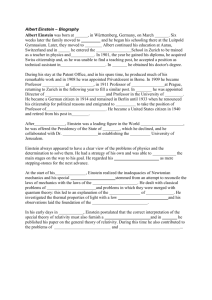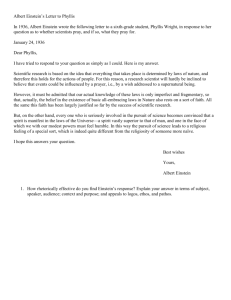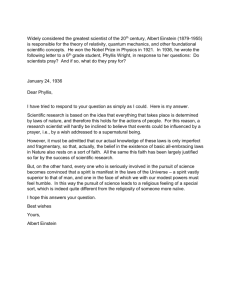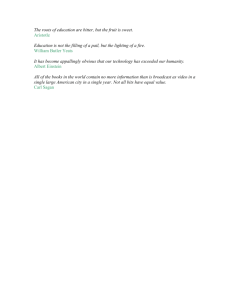Albert Einstein
advertisement
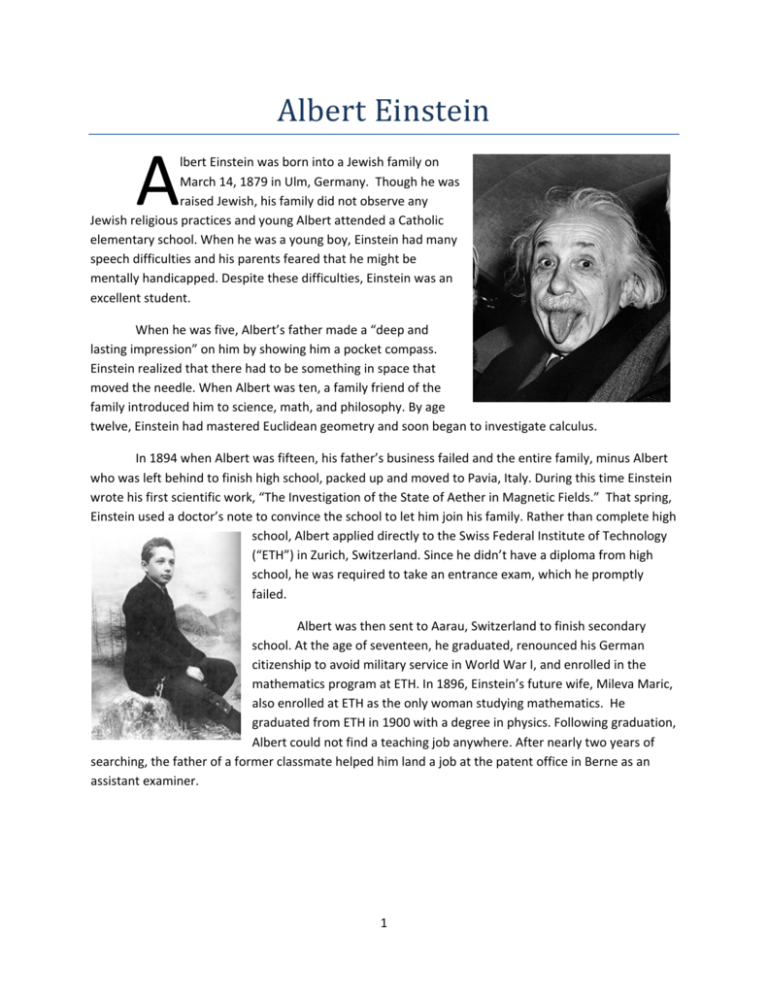
Albert Einstein A lbert Einstein was born into a Jewish family on March 14, 1879 in Ulm, Germany. Though he was raised Jewish, his family did not observe any Jewish religious practices and young Albert attended a Catholic elementary school. When he was a young boy, Einstein had many speech difficulties and his parents feared that he might be mentally handicapped. Despite these difficulties, Einstein was an excellent student. When he was five, Albert’s father made a “deep and lasting impression” on him by showing him a pocket compass. Einstein realized that there had to be something in space that moved the needle. When Albert was ten, a family friend of the family introduced him to science, math, and philosophy. By age twelve, Einstein had mastered Euclidean geometry and soon began to investigate calculus. In 1894 when Albert was fifteen, his father’s business failed and the entire family, minus Albert who was left behind to finish high school, packed up and moved to Pavia, Italy. During this time Einstein wrote his first scientific work, “The Investigation of the State of Aether in Magnetic Fields.” That spring, Einstein used a doctor’s note to convince the school to let him join his family. Rather than complete high school, Albert applied directly to the Swiss Federal Institute of Technology (“ETH”) in Zurich, Switzerland. Since he didn’t have a diploma from high school, he was required to take an entrance exam, which he promptly failed. Albert was then sent to Aarau, Switzerland to finish secondary school. At the age of seventeen, he graduated, renounced his German citizenship to avoid military service in World War I, and enrolled in the mathematics program at ETH. In 1896, Einstein’s future wife, Mileva Maric, also enrolled at ETH as the only woman studying mathematics. He graduated from ETH in 1900 with a degree in physics. Following graduation, Albert could not find a teaching job anywhere. After nearly two years of searching, the father of a former classmate helped him land a job at the patent office in Berne as an assistant examiner. 1 Einstein and Mileva had a daughter named Lieserl in 1902. Despite his mother’s disapproval he married Mileva in 1903. In 1904, their first son, Hans Albert, was born in Berne, and their second son Eduard was born in 1910. In spite of having children, Einstein and Mileva divorced in February of 1919. In June of that same year, he married Elsa Lowenthal. Elsa was his mother’s first cousin and his father’s second cousin. Though they had no children together, they raised Elsa’s two daughters from her first marriage. In 1905 Einstein began to make a name for himself as four of his papers were published in the leading German physics journal. These papers have been come to be known as the Annus Mirabilis Papers. At the age of 26, Einstein was awarded a PhD by the University of Zurich, his dissertation was entitled “A New Determination of Molecular Dimensions.” In 1911, Albert left the patent office and became an associate professor at the University of Zurich. Shortly afterward, he left the school to accept a full professorship at the Charles University in Prague. In Prague, he published a paper in which he issued a challenge to the scientists of the world concerning solar eclipses. In his paper, Einstein stated that it would be possible to detect when a solar eclipse was going to happen. In 1912, he returned to Switzerland to accept a professorship at his alma mater, ETH. It was here, in 1915, that Einstein developed his famous general theory of relativity. While he was a professor at the ETH, he was also a professor at the Humboldt University of Berlin. Starting in 1917 scientists from all over the world took up his challenge from 1911 and in 1919 his ideas were proven true by a British astronomy team. Later that year, in an article that appeared in a British newspaper, Einstein was praised saying that his ideas were the “greatest feat of human thinking about nature” and that relativity was “probably the greatest scientific discovery ever made.” In 1922, Einstein was awarded the 1921 Nobel Prize in Physics. As stated in their divorce agreement, Albert gave the prize money to his ex‐wife Mileva. In April of 1921, Einstein made his first trip to New York City. In 1933, Einstein immigrated to America and in 1940, became a citizen. He became very famous all over the world and eventually gave opinions and suggestions on topics other than science. In 1939, after Hitler took control of Germany, a scientist named Leo Szilard collaborated with Einstein on a letter to President Franklin D. Roosevelt urging him to build an atomic bomb before the Germans did. By 1942, the project evolved into the Manhattan Project. Contrary to popular opinion, Einstein had nothing more to do with building the atomic bomb than simply signing that letter. Einstein became more of an activist in the later days of his 2 life, standing up against communism and Hitler. He also became an advocate for humanitarianism and pushed for a Socialist style of government. In 1946, he collaborated with Rabbi Israel Goldstein, Middlesex University heir C. Ruggles Smith, and activist attorney George Alpert on the Albert Einstein Foundation for Higher Learning, Inc., which was formed to create a Jewish‐sponsored secular university, open to all students, on the grounds of the former Middlesex University in Waltham, Massachusetts. This site was chosen because it was easily accessible from both New York City and Boston, two of the biggest Jewish centers in the United States. In 1951, Einstein was offered the Presidency of Israel, but he declined because he wanted to stay in the United States. Albert Einstein was hospitalized on August 16, 1955 after an aortic aneurysm ruptured. He took a draft of a speech he was preparing for a television appearance commemorating the State of Israel's seventh anniversary with him to the hospital, but he did not live long enough to complete it. He died in Princeton Hospital early the next morning on August 17, 1955, at the age of 76, having continued to work until near the end. Einstein's remains were cremated and his ashes were scattered. Before the cremation, Princeton Hospital pathologist Thomas Stoltz Harvey removed Einstein's brain for preservation, without the permission of his family, in hope that the neuroscience of the future would be able to discover what made Einstein so intelligent. Einstein is considered by most to be one of the smartest people in history. In 1999, he was named “Person of the Century” by Time magazine. A Gallup poll reported that he was the fourth most admired person of the 20th century and according to The 100: A Ranking of the Most Influential Persons in History, Einstein is "the greatest scientist of the twentieth century and one of the supreme intellects of all time.” Einstein continues to influence modern day culture in many ways such as awards, scholarships, and the like, but he will always be remembered as one of the most brilliant minds ever. 3 Albert Einstein Born: March 14, 1879 Died: August 17, 1955 PREAMBLE. Einstein’s “Statement of Faith.” He states that the Will is made “In the Name of God, Amen.” Also, that he is mindful of the uncertainty of life and the certainty of death. FIRST. Directs that his debts be paid. We typically change this a bit to an “authorization,” but not a direction, that debts be paid to give a trustee some negotiation room. SECOND. This section gives all of his furniture and household good to his stepdaughter, Margot Einstein. THIRD. This section gives all of his books, personal clothing and personal effects, except his violin, to his secretary, Helena Dukas. FOURTH. This section gives his violin to his grandson, Bernhard Caesar Einstein. FIFTH. of trust. This section gives the sum of $20,000 to his stepdaughter Margot, outright and free SIXTH. This section gives the sum of $20,000 to his secretary Helena Dukas, outright and free of trust. SEVENTH. of trust. This section gives the sum of $15,000 to his son, Eduard Einstein, outright and free EIGHTH. This section gives the sum of $10,000 to his son, Albert Einstein, Jr., outright and free of trust. If he is deceased, then the money goes to his grandson, Bernhard Caesar Einstein. $20,000 in 1955 is roughly equivalent to $300,000 today. Because of the size of the gift, I would likely have recommended that these sums be held in trust. As most of you know, and as we have discussed on numerous occasions with our client families, when a distribution is directed to be made outright and free of trust, there is no opportunity to protect any of the assets or property from the beneficiary’s creditors, bad marriages, lawsuits or other problems. If something bad is happening in the beneficiary’s life when the distribution is directed to be made, the beneficiary may lose the entire inheritance to the problem. If the assets are left in trust “for the benefit of the beneficiary,” the trustee has the discretion to distribute the assets is everything is fine, or to hold the assets in trust, protected, for the benefit of the beneficiary until the problem abates. NINTH. This section sets up a trust in the amount of $10,000 for Marie Winteler, Albert’s sister and names Margot, Albert’s stepdaughter, as trustee. The distributions are to be made for Marie’s care, comfort and welfare. Not the “ascertainable standards” that make a trust a true spendthrift trust, but not bad nonetheless, because Margot has the discretion to either make a distribution or not. Further, if a Marie dies, the balance of the property goes to Margot, then to Helena Dukas, not to any of their children. ELEVENTH. This is an “apportionment” clause to take care of the question, “what if there is not enough money to make these specific gifts?” All gifts are to be reduced proportionately. TWELFTH. Direction to pay any taxes that might be due. THIRTEENTH. This section directs that all of Einstein’s manuscripts, copyrights, publication rights, royalties and royalty agreements and literary property of whatever kind and nature be held in trust for the benefit of Helena Dukas during her lifetime. On her death, all income and principal goes to Margot Einstein and on her death, the balance goes to Hebrew University. There is also a specific direction that the primary goal of the trust is to provide for the care, comfort and welfare of his secretary, then his stepdaughter, then the University and directs that if these beneficiaries need money, the manuscripts, etc. are directed to be sold. FOURTEENTH. The “residuary” clause splitting up everything else to his stepdaughter Margot. If she is deceased, then to his son Albert Einstein, Jr. FIFTEENTH. A direction that if the trust for his sister Marie is exhausted and she is still alive, that the residuary estate shall be reduced accordingly to further provide for her until her death. SIXTEENTH. Another apportionment clause specifically stating that if there is any estate tax due, it shall be apportioned to the manuscripts and copyrights under Article Thirteenth so that nobody else’s gift has to be reduced due to the estate taxes caused by the value of the intellectual property. SEVENTEENTH. Names the Executors of his will. Dr. Otto Nathan is named first, his attorney David J. Levy is named second. This section also names Dr. Otto Nathan and his secretary Helena Dukas as Trustees of the trusts. EIGHTEENTH. Boilerplate Trustee Powers provisions describing what the powers the trustees of the testamentary trusts have. LASTLY, Einstein’s will, like every will we draft for our clients, revokes all prior Wills and Codicils. This ensures that if another will surfaces after death, there is no question regarding which one was intended to control. Interesting omissions and other issues: (1) No statement of the members of his family or their ages or relation. (2) No “no contest clause” to keep someone from contesting the distribution of the estate, particularly because he provided for his secretary much more than the unequal distribution among his children. (3) The trusts put one family member in charge of another family member’s trust. We have found this strategy to be an absolute disaster. Summary: Not bad, but not great, either. With a bit more effort, Einstein could have done something great for his family and for his favorite charity, Hebrew University. For estate planning, one of the most brilliant individuals ever to live, gets a C+. I hope you enjoyed today’s Celebrity Will Analysis!

